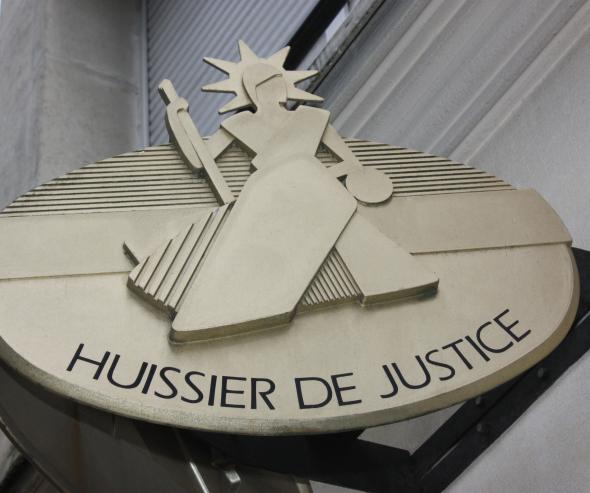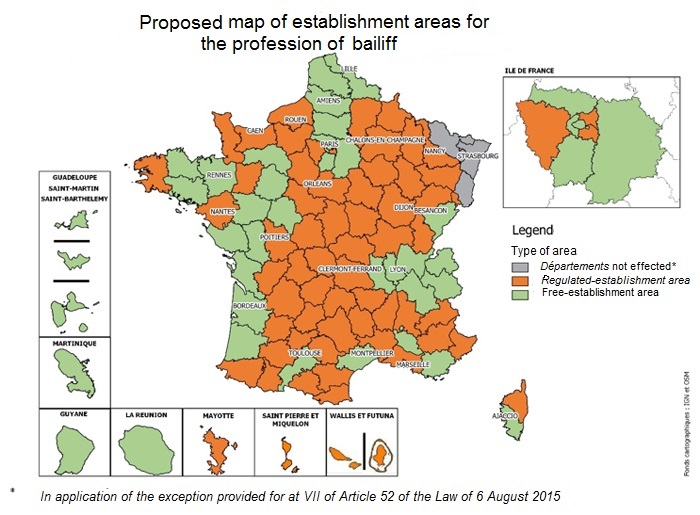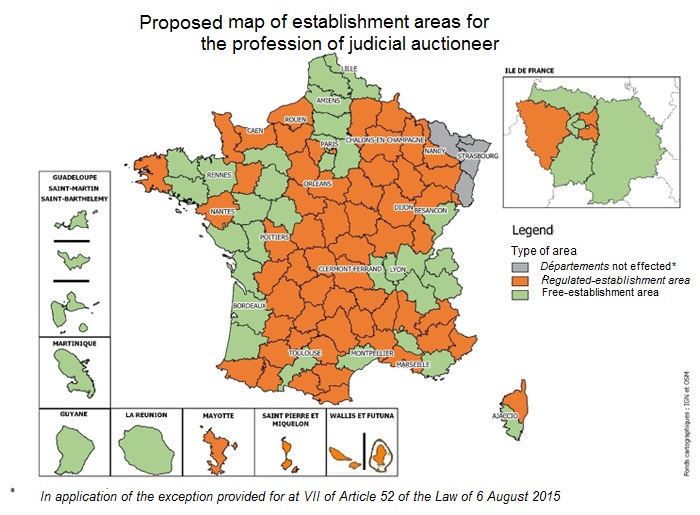20 December 2016: Freedom of establishment for bailiffs and judicial auctioneers - Application of the Framework resulting from the "Macron Law" of 6 August 2015

The Autorité de la Concurrence has drawn up maps
showing where new offices could be located for bailiffs and judicial auctioneers
It recommends the liberal establishment of 202 new bailiffs’ offices
and 42 new judicial auctioneers.
In accordance with Law 2015-990 of 6 August 2015 for growth, activity and equality of economic opportunities (also known as the "Macron Law") and as it did on 9 June 2016 for notaries1, the Autorité de la Concurrence proposes two maps for the establishment of new bailiffs and judicial auctioneers to the French Justice and Economy Ministers. Each map aims to reinforce the proximity or the provision of relevant professional services to the population.
| The opinions given by the Autorité regarding freedom of establishment pursue three aims: 1° To improve territorial coverage, in order to bring notaries closer to the population and the companies located in areas currently poorly served by public transportations; 2° To open up these professions, by giving newly qualified professionals the opportunity of setting up in practice and of proposing new services; and 3° To preserve the economic viability of the existing offices, especially in rural areas. As regards bailiffs and judicial auctioneers, the imbalances identified by the Autorité in terms of needs for services versus reservoir of qualified professionals wishing to set up in private-practice offices are smaller than those observed for the profession of notary: the two professions of bailiff and of judicial auctioneer combine demand that is increasing only slightly, or indeed that is stable (in particular due to the reduction in the scope of their monopolistic activities), a financial situation that is less favourable, and a stock of applicants for offices that is smaller. Therefore, after conducting an in-depth analysis of the various data, in particular the economic data, relating to these professions, the Autorité is recommending a 6.5% increase in the number of bailiffs, and a 10.7% increase in the number of judicial auctioneers in private practice by 2018. |
An opinion from the Autorité requested in the context of the provisions of the "Macron Law"
As public and ministerial officers, bailiffs and judicial auctioneers are appointed by the French Minister of Justice. Their number has decreased slightly over the last decade: 3,102 bailiffs and 391 judicial auctioneers held offices in 2015, as against 3,188 and 423 respectively in 2005. Their geographical distribution shows some supply-and-demand imbalances: for example, nine départements are currently without judicial auctioneers.
Its new advisory missions3 bring the Autorité to issue two opinions today on freedom of establishment: the first relating to bailiffs and the second to judicial auctioneers. It is also making recommendations to the French Government for improving access to offices, with particular regard to any differences based on age or gender, for reinforcing the territorial cohesion, and for gradually increasing the number of bailiffs and of judicial auctioneers across the country.
These recommendations are based on in-depth analyses of the economy and of the demography of the professions, closely tied in with the areas and with the needs, and on the responses to the public consultation launched last February (124 contributors for bailiffs and 13 contributors for judicial auctioneers).
In view of the choices made by the legislator, this new framework does not affect the départements of Bas-Rhin, Haut-Rhin, and Moselle, where establishment of bailiffs remains governed by rules derogating from the common law, and where, for historical reasons, judicial auctioneers do not practice.
Identification of the free-establishment areas
The Autorité proposes the French Government adopt the following maps:


These maps identify "free-establishment areas" (in green) and "regulated-establishment areas" (in orange). Apart from some exceptions4, these 100 establishment zones correspond to the metropolitan and overseas départements5.
The green zones are the ones where, as provided for in the Law, "the setting up of offices appears to be useful to strengthen the proximity or the range of the services offered" (Article 52 of the Law of 6 August 2015). Applicants who meet the conditions provided for by that law may, in those zones, be appointed as bailiffs or as judicial auctioneers within the recommended time frame for the creation of offices. The Law states that the time frame must be "compatible with a progressive increase in the number of professionals in the area in question", so as not to have an adverse effect on the conditions of practice of the existing offices.
The Autorité has identified 35 green areas for bailiffs, and 37 for judicial auctioneers. For the whole of France, it recommends appointing 202 bailiffs and 42 judicial auctioneers to be holders or partners of new offices, by 2018. This is a first stage of a process which aims to gradually balance the number of professionals to the needs of the French economy, by 2024. As provided for by the Law, the recommendations will be revised every two years.
These establishments will make it possible to reinforce the territorial coverage in the areas that are currently not well-endowed (large conurbations, in particular), and will contribute to improving the range of services offered, both quantitatively and qualitatively (reduction in file-processing time, increased customer choice, diversification in the range of services).
The Autorité has taken note of the method chosen by the French Justice and Economy Ministers in the regulation validating its proposed map for notaries6. The Autorité therefore recommends setting at 127 and 37, respectively, the total number of possible creations of bailiff offices and of judicial auctioneer offices during the first year of application of the map, and at 202 and 42, respectively, the total objective for private-practice professional appointments over the period 2016-2018.
These recommendations are proportionate to the needs identified locally, in order to take full account of the potential of the territory and also of the situation of the existing offices. For each zone, they are given in Tables 1 and 2 appended.
Procedure for submitting applications in the green areas
Applicants wishing to set up in green areas may submit their applications for eighteen months as from an upcoming date to be set by the French Minister of Justice. Completed electronically on the French Ministry of Justice’s website, the applications will be time stamped. Applications for establishment will be granted according to the recommendations, and depending on their date of receipt7. Applicants may apply in more than one green area, but they may submit only one application for each of the areas.
Regulation of establishments in the orange areas
The Autorité has also defined 65 orange areas for bailiffs and 63 orange areas for judicial auctioneers, where it has not identified any particular need for creating offices. This applies, for example to Côte-d’Or, Mayenne, Pyrénées-Orientales, Tarn, and Mayotte, for both professions.
Establishment of new professionals will not, in principle, be prohibited in orange areas, but it will require prior examination to eliminate the risk of "threatening the continuity of service of the existing offices and compromising the quality of service provided". The Minister of Justice will always be entitled to accept an application in such areas. If he or she refuses such an application, reasons must be given for the refusal "with regard, in particular, to the characteristics of the area and to the level of economic activity of the professionals in question". Any refusals will be made after an opinion has been given by the Autorité. In the context of such an opinion, the Autorité will, within two months after the submission of the full application, carry out a case-by-case examination of the potential local supply and demand for services in the area. The opinion will be made public.
The final map should be adopted shortly by the French Justice and Economy Ministers on the basis of the Autorité’s proposal.
The Autorité’s other recommendations
To ensure the success of the reform and as requested by the legislator, the Autorité is also making a series of recommendations to the Government aiming at:
- optimising the operation of free establishment, by giving priority to examining applications for establishment in areas of high potential, by freeing up and systematizing transmission of information, in particular statistics, to the Autorité, and by examining the opportuneness of extending the framework to the three départements of Alsace-Moselle;
- improving access to the professions of bailiff and of judicial auctioneer, by lengthening the time between appointment and swearing-in, by disseminating information about opportunities for taking over or becoming a partner in offices, by making available gender statistics, and by strengthening gender parity in the bodies who represent the professions.
In conclusion, these fifteen or so recommendations aim to strengthen the territorial cohesion of the services, to improve gender equality in access to offices, to better integrate newly qualified professionals, and to ensure continuity in quality of service, for the benefit of the users.
1Opinion 16-A-13 of 9 June 2016 on freedom of establishment for notaries, and on a proposal for a map of establishment areas, combined with recommendations about the time frame for creation of new notary’s offices (see press release of 9 June 2016)
2Ordinance 2016-728 of 2 June 2016 on the status of "commissaire de justice" ("commissioner of justice").
3Article L. 462-4-1 of the French Commercial Code (Code de Commerce), and Article 52 of the "Macron Law".
4For reasons related to the judicial map, the jurisdiction of the former General Court of first Instance (Tribunal de Grande Instance) of Dinan has been attached to the département of Ille-et-Vilaine to form the establishment area of "Ille-et-Vilaine and Dinan" (and therefore detached from the rest of the département of Côtes-d’Armor, which now forms the establishment area of "Côtes-d’Armor excluding Dinan"). The administrative areas of Saint-Martin and Saint-Barthélemy have been attached to the départment of Guadeloupe to form the establishment area of "Guadeloupe / Saint-Martin / Saint-Barthélemy". The administrative areas of Wallis- and-Futuna and Saint-Pierre and Miquelon each constitute an establishment area, limited to the territory of the administrative area in question. Finally, the départements of Bas-Rhin, Haut-Rhin, and Moselle are not affected due to the exception provided for at VII of Article 52 of the Law of 6 August 2015.
5Unlike with the notaries, for which it conducted its analyses at the level of employment areas, the Autorité chose the département as the relevant geographical scale for producing the maps for bailiffs and for judicial auctioneers. In view of the territorial competence of the professions in question (jurisdiction of the TGIs (general courts of first instance) of the département for bailiffs), of the actual locations of the main instructing parties (institutional clients such as social housing bodies, insurance companies, and banks for bailiffs, and commercial courts (tribunaux de commerce) for judicial auctioneers), and of the need to select a scale that was common to both professions (due to the plan to merge them), the département emerged as the most appropriate level.
6See the press release from the Autorité dated 20 September 2016
7If the number of applications for creating offices recorded in 24 hours after the date of opening of the submission of the application is greater, for one area, than the recommendations, the order of the applications will be determined by lots, under the conditions provided for by a future regulation issued by the French Minister of Justice.
> Table 1 - Recommendations with figures regarding bailiffs
> Table 2 – Recommendations with figures regarding judicial auctioneers
> See full opinion 16-A-25 of 20 December 2016 regarding the freedom of establisment for bailiffs and a proposed map of establisment areas, accompanied by recommandations on the pace of new offices’ creation for bailiffs
> See full opinion 16-A-26 of 20 December 2016 regarding the freedom of establisment for judicial auctioneers and a proposed map of establisment areas, accompanied by recommandations on the pace of new offices’ creation for judicial auctioneers
> Press contact:
Chloé Duretête Tel: +33 (0)1 55 04 01 20 / Email